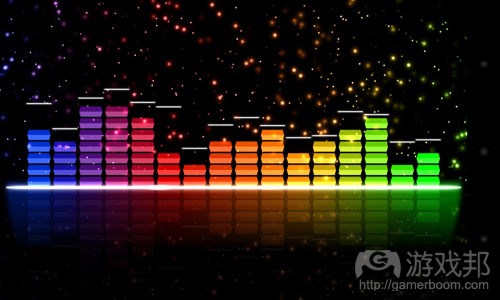为什么音频在电子游戏中如此重要
作者:Matthew Diener
我希望你能花些时间去思考自己最喜欢的电子游戏音乐—-不管是《最终幻想》中的获胜号角还是《Uncharted’s ‘Nate’s Theme’》充满威严的音乐。
现在,我要你闭上眼睛,仔细想想自己最喜欢的手机游戏(不是基于《愤怒的小鸟》那样的旋律)中的电子游戏音乐。
需要更多时间?我不会怪你。
不管怎样这在过去5年时间里已成定局,即手机游戏不能有效传达让人印象深刻的音乐主题—-我们必须为此做出改变。
2个唱盘和1个扩音器
对于许多开发者来说,音频是事后添加的内容。
制作音频很贵,并且也不存在明显的证据能够说明它会提高应用的销量,并且玩家也经常会将手机调成静音模式。
但是如果能够有效地设置音频,它便能够提高游戏的用户粘性并确保游戏在玩家眼中仍旧具有新鲜感。
让我们以《愤怒的小鸟》为例—-尽管现在的我们已经不再将这款游戏作为娱乐首选,但因为我们已经听过这类游戏的歌曲无数次了,所以我们总是能够自然而然地哼出口。
并且当我们在户外听到这款游戏歌曲的前4个音符时便能立马猜出有人在玩《愤怒的小鸟》,我们的脑海中也会浮现出游戏中的相关场景。
这真的具有很强大的吸引力。
独立游戏和独立音乐
当然了,并不是每一款游戏都有足够的预算请得起Nobuo Uematsu,Grant Kirkhope或Greg Edmonson这样知名的作曲家,但却并不等于它们就不能拥有让人印象深刻的音乐。
在独立游戏爆发前,独立音乐领域中已经聚集了许多想要出名的音乐家。直到各种全新且游戏友好型音乐(如芯片音乐)不断涌现出来的今天,这种情况依然存在着。
不断发展的独立游戏和不断发展的独立音乐间的协同作用似乎非常明显,它们能够帮助彼此提高曝光率,吸引更多粉丝的注意,并最终带来更多利益。
为了获取成功,我们需要有效地管理期望。
手机游戏玩家并不会寻找一首60声道的影视原声带去搭配一款益智游戏,但是让人印象深刻的旋律与吸引人的背景音乐将能更好地吸引玩家进入游戏中。
有效的影响
暂且先不谈音乐,音频也会通过让人难忘的音效而显著提高玩家的用户粘性。
也许这种说法太过夸张,但音效的确能像美妙的音乐那样久久萦绕在我们的记忆中。
想想马里奥跳起撞击硬币以及《传送门2》的炮塔发出的尖锐的哀鸣,你都可以参照这类型音效去创造属于自己的独特音频。
如果你的游戏突出的是一种签到性行动(游戏邦注:如收集货币或跳跃障碍),你便可以借此创造出让人印象深刻的音效。
当游戏发行时,你也可以以SMS等形式将这些音效传递给玩家让他们将其安装在自己的手机或平板电脑上—-从而有效地拓宽游戏的触及范围。
结尾
最后,决定音频在手机游戏中的角色大小是取决于你而非预算。的确也有许多没有音频而取得巨大成功的例子,所以你需要为此做出决定。
这是你能够做出的选择—-但是如果你希望自己的游戏能够突显于众多竞争者中,并更久地存在于玩家心中,你就需要确保游戏不仅能够吸引玩家的眼球,同时也能吸引他们的耳朵。
(本文为游戏邦/gamerboom.com编译,拒绝任何不保留版权的转载,如需转载请联系:游戏邦)
Opinion: Don’t drop the beat – why you should care about your game’s audio
by Matthew Diener
I want you to take a moment to think about your favourite video game music – whether it’s the iconic Final Fantasy victory fanfare or the sweeping majesty of Uncharted’s ‘Nate’s Theme’.
Hum a few bars, it’s good for the soul.
Now, I want you to close your eyes and think about your favourite video game music from a mobile game that isn’t the Angry Birds theme.
Need more time? I don’t blame you.
For all that it’s accomplished over the past five years, mobile gaming has almost completely failed to deliver memorable musical themes – and that’s ripe for changing.
Two turntables and a microphone
For many developers, audio is an afterthought.
It can be expensive, there’s little quantifiable evidence that it will help app sales, and it’s easy for players to flip the mute switch on their phones.
But if audio is handled properly, and integrated with care, it can provide a powerful engagement and discovery tool to keep your app fresh in the minds of gamers.
Consider the Angry Birds example I mentioned – while many of us have moved past Rovio’s flying fowl as our preferred means of mobile entertainment, we’ve all heard the Angry Birds theme innumerable times and could probably sing it in its entirety if forced.
Further, when we’re out in the wild and we hear the first four notes of the now-iconic theme, we know that someone is playing Angry Birds and our minds pull up all sorts of images and memories associated with the game.
It’s a powerful hook, and one that was accomplished with about 10 measures of music in 4/4 time.
Band on the run
Of course, not every game has the budget to enlist the talents of composers like Nobuo Uematsu, Grant Kirkhope, or Greg Edmonson, but it doesn’t need to in order to create a memorable hook.
Before the indie games scene exploded, the indie music scene was already crowded with talented musicians looking to make names for themselves. This immense talent pool still exists today, with plenty of new, game-friendly genres like chiptune music being well-represented.
The synergy between a rising indie game and a rising indie musician seems obvious, as both can help the other amass exposure, fans, and – ultimately – money.
In order to succeed, however, expectations need to be managed.
Mobile gamers aren’t looking for a 60-track OST to accompany a new puzzle game, but a memorable theme and some compelling background music can do wonders to immerse players in a game.
Effective effects
Setting aside music, audio also offers another opportunity for player engagement through memorable sound effects.
While it might seem like an ambitious claim, sound effects stick in our memories as prominently as melodies do.
Think of Mario jumping to hit a coin block or the high-pitched whine of Portal 2′s turrets, and you’ll have a good frame of reference for the sort of effect you’re after.
If your game features a signature action – like collecting coins or jumping over obstacles – then there’s an opportunity to create a memorable sound effect.
And once the game takes off, these sound effects can also be released as SMS or alert tones for players to install on their phones and tablets – thus broadening the game’s reach.
Coda
Ultimately, it’s up to you not your budget to decide how big of a role audio will play in your mobile game. There’s been plenty of success without audio, so you may decide to go without it.
That’s a choice you can make – but if you want your game to stand out from the pack, and perhaps linger in the minds of gamers for years to come – make sure your game appeals to both the eyes and ears of your players.(source:pocketgamer)
上一篇:关于优化手机应用商店的9个建议








































 闽公网安备35020302001549号
闽公网安备35020302001549号